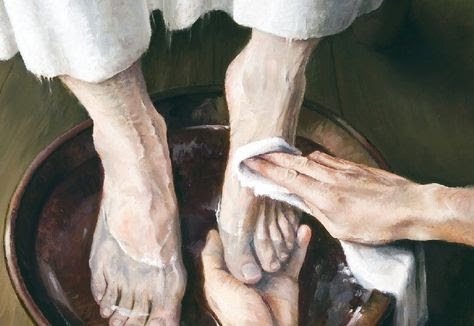A Call to Counter-Cultural Humility
“[A]nd all of you, clothe yourselves with humility toward one another, for God is opposed to the proud, but gives grace to the humble. Therefore humble yourselves under the mighty hand of God, that He may exalt you at the proper time, casting all your anxiety on Him, because He cares for you.” - 1 Peter 5:5b-7
Humility, Humility, Humility
In 410 AD, a student named Dioscorus wrote to Augustine, wanting to know the fundamental instructions of the Christian religion. So Augustine wrote back, “The first part is humility; the second, humility; the third, humility... if you were to ask me, however often you might repeat the question, what are the instructions of the Christian religion, I would be disposed to answer always and only, humility.” In 1 Peter 5:5-7, it’s as if the churches in Asia Minor wrote a letter to Peter and asked him, “What are the instructions of the Christian religion?” and three times, Peter responds: “Clothe yourselves with humility... God gives grace to the humble... [and] humble yourselves under the mighty hand of God.” The first part is humility; the second is humility; the third is humility.
Why does Peter respond that way to the churches in Asia Minor? Christianity is being dragged through the mud in the Roman Tribune newspaper. Children of the church are name-called at school, and they come home ashamed. Their business owners have lost most of their patrons, and after 20 years, they’re going bankrupt. And yet, Peter, you’re telling them: humility, humility, humility! Why? Because under the pressure of a hostile environment, the temptation is to alleviate the aggression, either by withdrawing, by retaliating, or by conforming. Peter is saying don’t conform to the Greco-Roman standard of values. Don’t alleviate the hostility by becoming like them in their domineering, self-serving, and social ladder-climbing. Instead, base what you value on what God values, and what is most precious to God is a humble heart.
So then, why was Peter’s call to humility so counter-cultural? How does the Christian idea of humility subvert the world’s standards? Look at v. 5b. Peter writes, “[A]nd all of you, clothe yourselves with humility toward one another.” Clothing in the Greco-Roman era was an index of social status. Clothing indicates your position in the world. It’s a lot like our culture today. People spend thousands for the status symbol of name brands. Why? Miuccia Prada, a fashion designer worth 4.5 billion dollars, observed, "What you wear is how you present yourself to the world... Fashion is instant language." People spend money on clothing because clothing is talkative. It speaks achievement, wealth, beauty, intelligence; or failure, poverty, unattractiveness, and laziness. And Peter is saying that the clothing of the Christian, what Christians should present to the world, must be humility. And this mark of humility would have been scandalous for three reasons.
Clothing Meant for Slaves
First, notice that Peter says, “clothe yourselves.” This is the only time the verb shows up in all of the New Testament. It’s specifically associated with the aprons slaves tied over their undergarments. It’s what slaves wore in order to perform their domestic duties. It was clothing dirtied from sweat and hard work. This verb would’ve triggered in the minds of the churches in Asia Minor the image of a slave. But more than that, Peter says, “clothe yourselves with humility.” The noun “humility” is a compound noun that literally means slave mindset. Peter is saying, clothe yourself with a slave mentality. In a culture that prioritized status, where clothing speaks of your position in society, Peter is saying, be clothed in the mindset of those of the lowest status, those on the lowest rung of the social hierarchy, those at the outer perimeters of honorable society, those who make their living serving others. The counter-cultural call to humility is a call to relinquish all claims of status you think you have in this world or in the church and adopt the mindset of someone with no status.
Clothing Meant for Others
Second, Peter adds, “clothe yourselves with humility toward one another.” Most crucially, this means that humility is not an individualistic and introspective concept. Humility does not happen in a self-isolated vacuum. It’s not this idea of self-deprecation, shyness, passivity, or lack of ambition. It’s not having a hunched back, never looking up beyond your feet, never comfortable accepting a compliment. What Peter is saying—and what the Greeks and Romans thought was scandalous—is that humility is relational and other-centered. You make yourself inferior not to yourself but in the service of others. Far from David Hume’s understanding of humility as a “monkish virtue,” true humility is the most energetic, lively, and active virtue you can have. Why? Because humility activates service for others.
C. S. Lewis noticed this mistaken individualized view of humility in Mere Christianity. He penned, “Do not imagine that if you meet a really humble man, he will be what most people call ‘humble’ nowadays: he will not be a sort of greasy, smarmy person who is always telling you that, of course, he is nobody. Probably all you will think about him is that he seemed a cheerful, intelligent chap who took a real interest in what you said to him... He will not be thinking about humility: he will not be thinking about himself at all.” In other words, you can put on sackcloths and ashes to draw attention to yourself. But the clothing of humility is not about yourself. Putting on humility is putting on work clothes in service for others.
Clothing Meant for All
Finally, perhaps the most counter-cultural aspect of this command is three words. The entire structure of the Roman social hierarchy is subverted with these three words. All notions of competition, one-upmanship, and self-glorification are cut down by these three words. The words are, “all of you.” To the younger and the older. To the wives and the husbands. To the Jews and the Gentiles. To the uneducated and the doctors. To the poor and the rich. To the congregation and the elders. In a culture where clothing is the symbol of status, Peter commands all of them to wear the exact same slave apron called humility.
Thus, just as Roman centurions wear red tunics and plumed helmets, just as police officers wear badges and bulletproof vests, just as hockey players wear shoulder pads and ice skates, every Christian wears a uniform. On Sunday morning, when you open your closet doors, when you sift through the clothes hangers, what do you decide to wear? All of us—no matter how much money you have, no matter what college you went to or what occupation you have, no matter how well you know scripture and theology, no matter how spiritual you think you are, whatever rank or status you think you have in this world or in the church, give it up. And wear the self-crucifying, other-centered, slave-apron called humility.
He Humbled Himself For Us
You may ask, what does this counter-cultural humility look like? Does this mean we should strive for some kind of egalitarian utopia? Or that church polity is wrong? No. The call to humility is not about the abolition of political, church, or marriage hierarchies. It is a posture of the heart, that operates within those structures. So what does that even look like? Why do you think Peter chose a clothing metaphor in the first place? The night Jesus was betrayed, he had supper with his disciples, then almost out of nowhere, it reads in John 13:4, “[Jesus] laid aside His garments; and taking a towel, He girded Himself.” Jesus clothes himself with humility, then proceeds to perform the domestic duty of a slave. It reads, “Then He poured water into the basin, and began to wash the disciples’ feet and to wipe them with the towel with which He was girded.” And do you remember, who was the only one to resist Christ’s humility? It was the very one who wrote 1 Peter. John wrote, “So He came to Simon Peter. He said to Him, ‘Lord, do You wash my feet?’”
In hindsight, it’s easy to critique Peter. But honestly, I resonate with him. How could the holy God get on his knees and scrub the dead skin and grime caked between my toes? I wouldn’t ask Shawna, my own wife, to do that. That’s humiliating. I doubt most loving parents would ask their children to do it. That’s beneath them. And yet, here’s Jesus Christ, the one with the highest status in all the universe—to whom the most glorious angels would shield their eyes lest they dishonor him with their unworthiness—the one to whom every knee shall bow in heaven and on earth, gets on his knees and performs the duties of a slave for us—us who would betray him, who would abandon him, who would reject him before the rooster crows. “Lord, do you wash my feet?” Would you serve me?” And with his heart set towards the cross, he looks at me in the eyes and says, “I came not to be served but to serve.”
He clothed himself in humility, not for himself, but for us. May we, in turn, clothe ourselves in Christ-like humility and give ourselves in service to others.

